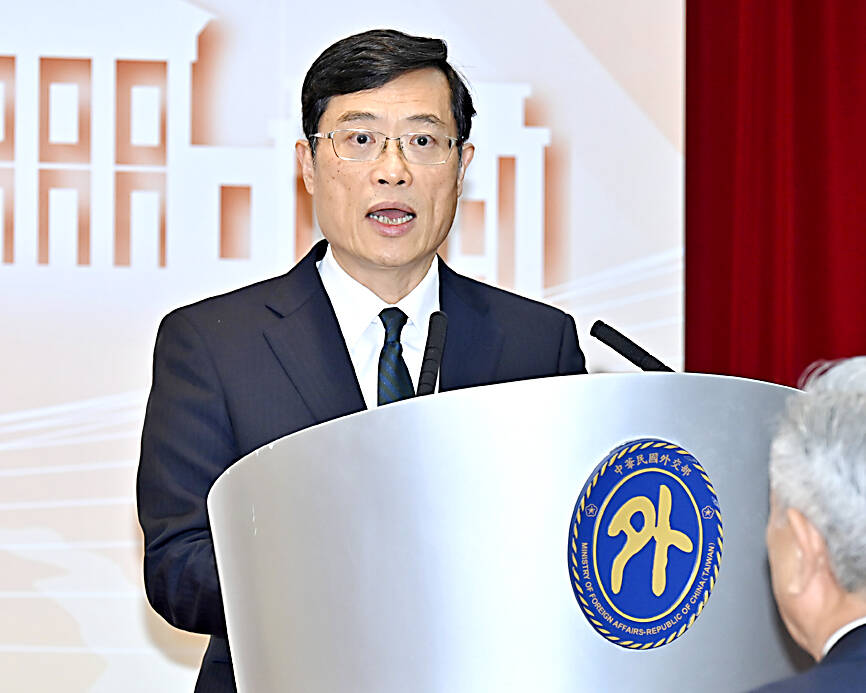Taiwan’s investments in countries under the government’s New Southbound Policy surpassed investments in China in the first half of this year, Deputy Minister of Economic Affairs Chen Chern-chyi (陳正祺) said on Tuesday.
Taiwan’s investments in the 18 countries covered by the policy totaled US$2.126 billion in the first six months of this year, compared with US$1.9 billion invested in China, Chen told the Taiwan-ASEAN-India Strategic Investment Partnership Forum in Taipei.
The New Southbound Policy is designed to enhance trade and exchanges between Taiwan and 18 countries: Australia, Bangladesh, Bhutan, Brunei, Cambodia, India, Indonesia, Laos, Malaysia, Myanmar, Nepal, New Zealand, Pakistan, Philippines, Singapore, Sri Lanka, Thailand and Vietnam.

Photo: Tu Chien-jung, Taipei Time
The policy echoes an international trend by reducing economic dependence on a single market, Chen said, apparently referring to China.
It reinforces economic ties with ASEAN and many others, he said.
The New Southbound Policy has bolstered Taiwan’s economic resilience, he said.
Last year, Taiwan’s investments in the 18 countries under the policy rose 121.41 percent from a year earlier to US$5.3 billion, Chen said, adding that many Taiwanese electronics companies have built clusters in ASEAN.
Taiwanese tech heavyweights such as iPhone assembler Hon Hai Precision Industry Co (鴻海), and contract electronics makers Wistron Corp (緯創), Quanta Computer Inc (廣達), Pegatron Corp (和碩), Compal Electronics Inc (仁寶) and Inventec Corp (英業達) have set up production sites in Vietnam, he said.
In Thailand, Taiwanese firms including Apex International Co (泰鼎) and Taiflex Scientific Co (台虹), have built a printed circuit board cluster, while Indonesia has attracted footwear makers Pou Chen Corp (寶成) and Feng Tay Enterprises Co (豐泰), as well as Eclat Textile Co (儒鴻), Chen said.
To meet carbon emissions reduction goals, Taiwanese investors such as Hon Hai and power management solution provider Delta Electronics Inc (台達電) have invested in emerging businesses in Thailand, Indonesia and India, including energy storage solution providers and electric vehicle manufacturers, he said.

CHIP RACE: Three years of overbroad export controls drove foreign competitors to pursue their own AI chips, and ‘cost US taxpayers billions of dollars,’ Nvidia said China has figured out the US strategy for allowing it to buy Nvidia Corp’s H200s and is rejecting the artificial intelligence (AI) chip in favor of domestically developed semiconductors, White House AI adviser David Sacks said, citing news reports. US President Donald Trump on Monday said that he would allow shipments of Nvidia’s H200 chips to China, part of an administration effort backed by Sacks to challenge Chinese tech champions such as Huawei Technologies Co (華為) by bringing US competition to their home market. On Friday, Sacks signaled that he was uncertain about whether that approach would work. “They’re rejecting our chips,” Sacks

NATIONAL SECURITY: Intel’s testing of ACM tools despite US government control ‘highlights egregious gaps in US technology protection policies,’ a former official said Chipmaker Intel Corp has tested chipmaking tools this year from a toolmaker with deep roots in China and two overseas units that were targeted by US sanctions, according to two sources with direct knowledge of the matter. Intel, which fended off calls for its CEO’s resignation from US President Donald Trump in August over his alleged ties to China, got the tools from ACM Research Inc, a Fremont, California-based producer of chipmaking equipment. Two of ACM’s units, based in Shanghai and South Korea, were among a number of firms barred last year from receiving US technology over claims they have

It is challenging to build infrastructure in much of Europe. Constrained budgets and polarized politics tend to undermine long-term projects, forcing officials to react to emergencies rather than plan for the future. Not in Austria. Today, the country is to officially open its Koralmbahn tunnel, the 5.9 billion euro (US$6.9 billion) centerpiece of a groundbreaking new railway that will eventually run from Poland’s Baltic coast to the Adriatic Sea, transforming travel within Austria and positioning the Alpine nation at the forefront of logistics in Europe. “It is Austria’s biggest socio-economic experiment in over a century,” said Eric Kirschner, an economist at Graz-based Joanneum

BUBBLE? Only a handful of companies are seeing rapid revenue growth and higher valuations, and it is not enough to call the AI trend a transformation, an analyst said Artificial intelligence (AI) is entering a more challenging phase next year as companies move beyond experimentation and begin demanding clear financial returns from a technology that has delivered big gains to only a small group of early adopters, PricewaterhouseCoopers (PwC) Taiwan said yesterday. Most organizations have been able to justify AI investments through cost recovery or modest efficiency gains, but few have achieved meaningful revenue growth or long-term competitive advantage, the consultancy said in its 2026 AI Business Predictions report. This growing performance gap is forcing executives to reconsider how AI is deployed across their organizations, it said. “Many companies